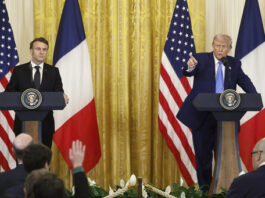KINSHASA, Congo — This year has seen a significant escalation in violence in eastern Congo, with over 7,000 reported deaths attributed to the actions of M23 rebels, who are believed to have the support of Rwanda, as communicated by Congo’s prime minister on Monday.
Judith Suminwa Tuluka addressed the U.N. Human Rights Council, highlighting the dire security and humanitarian conditions in the region, stating that the situation has reached “alarming levels.”
The conflict has intensified notably in recent weeks, marked by the rebels’ capture of the crucial city of Goma in January, followed by Bukavu, another provincial capital. M23 has emerged as the most formidable among nearly 100 armed factions struggling for control in Congo’s mineral-rich eastern territories, which are home to vast, largely untapped resources vital to global technology industries.
The United Nations has expressed concerns regarding the broader implications of this conflict on the region, which has faced decades of underlying tensions leading to the displacement of millions of people.
The M23 group has indicated ambitions to overthrow the Congolese government led by President Félix Tshisekedi in the capital, Kinshasa, which has had a precarious hold over the eastern regions. Despite international calls for a ceasefire, the rebels continue their advances, supported by approximately 4,000 Rwandan troops positioned nearby Goma.
Leaders of the M23 have proclaimed their mission to eradicate what they term as bad governance and insecurity in urban areas. They now pose a threat to the city of Uriva, where reports of gunfire were noted over the last weekend.
According to the M23, their fight aims to safeguard ethnic Tutsis and Congolese with Rwandan ancestry from persecution, seeking to elevate Congo from its status as a failed state to a modern nation.
Experts have raised skepticism about these justifications, suggesting they may mask Rwanda’s true motives in the regional dynamics.
Eyewitnesses in Goma have reported that the M23’s intelligence unit is actively hunting for former Congolese soldiers and criminals, although these searches have led to tragic misidentifications. One incident involving the deaths of 11 young individuals occurred on Sunday while they were waiting to attend a weightlifting class, as they were mistakenly identified as thieves.
This website uses cookies so that we can provide you with the best user experience possible. Cookie information is stored in your browser and performs functions such as recognising you when you return to our website and helping our team to understand which sections of the website you find most interesting and useful.
